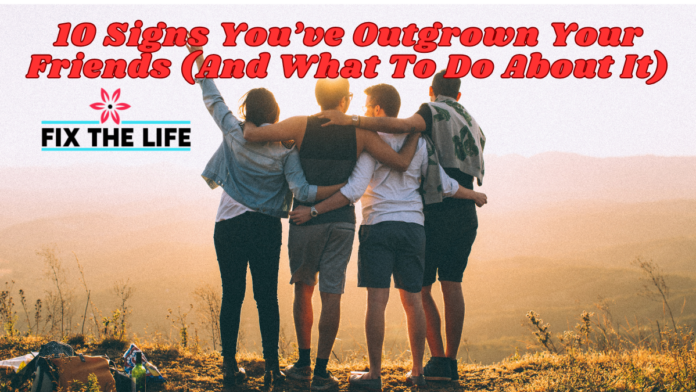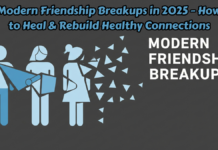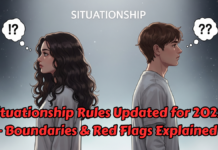Friendships evolve over time, but not all of them grow in the same direction. As people change, their values, interests, and emotional needs shift.
When a friendship no longer feels fulfilling or aligned with your growth, it might be a sign that you’ve outgrown it. While realizing this can be emotionally difficult, recognizing the signs is the first step toward personal growth and healthier connections.
Here are 10 signs you’ve outgrown your friends and strategies on how to navigate a friendship breakup with clarity and grace.
1. Conversations Feel Forced Instead of Natural
If your discussions feel repetitive, surface-level, or exhausting, rather than engaging or exciting, it’s a sign that your interests and perspectives may have shifted.
What It Looks Like:
- Struggling to find meaningful topics to talk about.
- Conversations revolving around the past instead of shared future goals.
- Feeling disconnected or disinterested in their stories and priorities.
As you grow, depth and emotional resonance become essential in friendships.
Differences in values can create a disconnect in priorities, ambitions, and emotional understanding.
Red Flags:
- Feeling uncomfortable with their choices or perspectives.
- Noticing fundamental disagreements that weren’t there before.
- Struggling to relate to their opinions on relationships, goals, or ethics.
Growth often means aligning with people who share your evolving values.
3. Your Goals & Ambitions Have Shifted
Career, personal growth, or lifestyle aspirations can lead you in different directions, making old friendships feel out of sync.
Signs of Growing Apart:
- You are focused on self-improvement, while they remain stagnant.
- Their ambitions feel disconnected from your personal or professional goals.
- Conversations lack encouragement or shared motivation.
Expanding your circle to include people who inspire and support your journey can be a game-changer.
4. You Feel Drained Rather Than Energized After Meeting Them
Friendships should uplift, not exhaust. If interactions feel emotionally taxing, your energy may no longer align.
Common Indicators:
- Feeling mentally drained instead of refreshed after spending time together.
- Noticing patterns of negativity or toxic behaviors.
- Avoiding interactions to preserve emotional energy.
Prioritizing healthy relationships ensures emotional well-being.
5. You’re No Longer Comfortable Being Yourself
Friendships should allow authenticity. If you feel the need to filter your thoughts or personality, something may be off.
Examples:
- Hesitating before expressing your true opinions or emotions.
- Feeling judged or misunderstood rather than accepted.
- Adjusting your personality to fit in rather than be yourself.
Genuine connections celebrate personal growth, not suppress it.
6. They Dismiss Your Achievements or Growth
Supportive friendships encourage success, while outdated ones might resist change.
How It Shows Up:
- Minimizing your accomplishments or shifting focus away.
- Acting indifferent or dismissive about milestones.
- Failing to reciprocate encouragement or emotional support.
Friendships should be a space for shared joy, not silent resentment.
7. Conflict Feels Unresolved or One-Sided
If misunderstandings linger without resolution, communication breakdowns may indicate a deeper issue.
Warning Signs:
- Conflict avoidance instead of productive discussions.
- Unbalanced dynamics where one person constantly compromises or sacrifices.
- Feeling unheard, disregarded, or invalidated.
Healthy friendships thrive on mutual understanding and respect.
8. You Feel Nostalgic Instead of Connected
If your friendship feels like a memory rather than a present connection, it’s worth examining whether the relationship still serves you.
What It Looks Like:
- Holding onto the friendship out of habit rather than enjoyment.
- Conversations revolving around old times rather than current experiences.
- Feeling disconnected from who they are today.
Friendships should evolve alongside personal growth.
9. You’re the Only One Making Effort
If maintaining the friendship feels one-sided, the relationship dynamic may no longer be balanced.
Red Flags:
- Always initiating conversations or meet-ups.
- Receiving minimal engagement, enthusiasm, or reciprocation.
- Feeling unappreciated or ignored.
Healthy friendships thrive on mutual effort, not obligation.
10. You Fear Letting Go More Than Enjoying the Friendship
If fear is the only reason you’re holding on, reassessing the relationship may be necessary.
How to Recognize It:
- Avoiding friendship shifts due to guilt rather than genuine connection.
- Staying in the relationship out of comfort rather than fulfillment.
- Feeling relief rather than sadness at the thought of moving on.
Letting go makes room for new, meaningful connections.
What to Do If You’ve Outgrown a Friendship
1. Accept That Change Is Natural
Outgrowing friends doesn’t mean rejecting the past—it means embracing new experiences.
2. Communicate Your Feelings (If Necessary)
If the friendship feels worth salvaging, honest conversations can create clarity.
3. Set Healthy Boundaries
Limit interactions if they no longer feel uplifting or meaningful.
4. Expand Your Social Circle
Connect with people who align with your evolving goals and mindset.
5. Allow Friendships to Fade Naturally
Not every friendship needs a dramatic breakup—some simply drift apart with time.
Recommendation
How to Spot a Love Bomber in the First Week of Dating
15 Relationship Goals for Couples in 2025: Build a Stronger Bond
10 Signs You’ve Outgrown Your Friends (And What To Do About It)
10 Rules of Living Alone Every Woman Should Know
7 Signs You’re in a One-Sided Relationship
FAQs: Common Questions About Outgrowing Friendships
Q1: Is outgrowing friends normal?
A1: Yes, Personal growth naturally changes relationship dynamics over time.
Q2: How do I know if a friendship is worth saving?
A2: Consider whether communication, effort, and mutual growth still exist.
Q3: Should I explain to my friend why I’m pulling away?
A3: If the friendship holds deep meaning, communicating feelings may provide closure. Otherwise, gradual distance can be enough.
Q4: How can I move on without guilt?
A4: Recognize that growth is necessary—letting go allows new connections to thrive.
Q5: Can old friendships ever rekindle after drifting apart?
A5: Yes, If both people grow and reconnect, friendships can evolve in new ways.
Final Thought
Recognizing outgrowing friends signs is a valuable step toward personal development. Friendships should enhance growth, not hinder it—learning to embrace change, set boundaries, and cultivate meaningful connections ensures a strong, fulfilling social life.




